Dante: The Divine Comedy
Inferno Cantos XXII-XXVIII
Authored and translated by A. S. Kline © Copyright 2000, All Rights Reserved.
This work may be freely reproduced, stored and transmitted, electronically or otherwise, for any non-commercial purpose. Conditions and Exceptions apply.
Contents
- Inferno Canto XXII:1-30 The Poets view more of the Fifth Chasm
- Inferno Canto XXII:31-75 Ciampolo
- Inferno Canto XXII:76-96 Ciampolo names other Barrators
- Inferno Canto XXII:97-123 Ciampolo breaks free of the Demons
- Inferno Canto XXII:124-151 The Malebranche quarrel
- Inferno Canto XXIII:1-57 The Sixth Chasm: The Hypocrites
- Inferno Canto XXIII:58-81 The Hypocrites
- Inferno Canto XXIII:82-126 The Frauti Gaudenti: Caiaphas
- Inferno Canto XXIII:127-148 The Poets leave the Sixth Chasm
- Inferno Canto XXIV:1-60 The Poets climb up: Virgil exhorts Dante
- Inferno Canto XXIV:61-96 The Seventh Chasm: The Thieves
- Inferno Canto XXIV:97-129 Vanni Fucci and the serpent
- Inferno Canto XXIV:130-151 Vanni Fucci’s prophecy
- Inferno Canto XXV:1-33 Cacus
- Inferno Canto XXV:34-78 Cianfa and Agnello
- Inferno Canto XXV:79-151 Buoso degli Abati and Francesco
- Inferno Canto XXVI:1-42 The Eighth Chasm: The Evil Counsellors
- Inferno Canto XXVI:43-84 Ulysses and Diomede
- Inferno Canto XXVI:85-142 Ulysses’s last voyage
- Inferno Canto XXVII:1-30 Guido Da Montefeltro
- Inferno Canto XXVII:31-57 The situation in Romagna
- Inferno Canto XXVII:58-136 Guido’s history
- Inferno Canto XXVIII:1-21 The Ninth Chasm: The Sowers of Discord
- Inferno Canto XXVIII:22-54 Mahomet: the Caliph Ali
- Inferno Canto XXVIII:55-90 Pier della Medicina and others
- Inferno Canto XXVIII:91-111 Curio and Mosca
- Inferno Canto XXVIII:112-142 Bertrand de Born
Inferno Canto XXII:1-30 The Poets view more of the Fifth Chasm
I have seen cavalry moving camp, before now, starting a foray, holding muster, and now and then retiring to escape; I have seen war-horses on your territory, O Aretines, and seen the foraging parties, the clash of tournaments, and repeated jousts; now with trumpets, now with bells, with drums and rampart signals, with native and foreign devices, but I never yet saw infantry or cavalry, or ship at sight of shore or star, move to such an obscene trumpet.
We went with the ten demons: ah, savage company! But, they say: ‘In church with the saints, and in the inn with the drunkards.’ But my mind was on the boiling pitch, to see each feature of the chasm, and the people who were burning in it. Like dolphins, arching their backs, telling the sailors to get ready to save their ship, so, now and then, to ease the punishment, some sinner showed his back, and hid as quick as lightning.
And as frogs squat, at the edge of the ditchwater, with only mouths showing, so that their feet and the rest of them are hidden, so the sinners stood on every side: but they instantly shot beneath the seething, as Barbariccia approached.
Inferno Canto XXII:31-75 Ciampolo
I saw, and my heart still shudders at it, one linger, just as one frog remains when the others scatter: and Graffiacane, who was nearest him, hooked his pitchy hair, and hauled him up, looking, to me, like an otter. I already knew the names of every demon, so I noted them well as they were called, and when they shouted to each other, listened out.
‘O Rubicante, see you get your clutches in him, and flay him,’ all the accursed tribe cried together. And I: ‘Master, make out if you can, who that wretch is, who has fallen into the hands of his enemies.’ My guide drew close to him, and asked him where he came from, and he answered: ‘I was born in the kingdom of Navarre. My mother placed me as a servant to a lord, since she had borne me to a scurrilous waster of himself and his possessions. Then I was of the household of good King Thibaut, and there I took to selling offices, for which I serve my sentence in this heat.’
And Ciriatto, from whose mouth a tusk, like a boar’s, projected on each side, made him feel how one of them could rip. The mouse had come among the evil cats: but Barbariccia caught him in his arms, and said: ‘Stand back, while I fork him!’ And, turning to my Master, he said: ‘Ask away, if you want to learn more from him, before someone else gets at him.’
So my guide said: ‘Now say, do you know any of the other sinners under the boiling pitch that is a Latian?’ And Ciampolo replied: ‘I separated, just now, from one who was a neighbour of theirs over there, and I wish I were still beneath him, since I should not then fear claw or hook!’ And Libicocco cried: ‘We have endured this too long!’ and grappled Ciampolo’s arm with the prong, and, mangling it, carried away a chunk. Draghignazzo, too, wanted a swipe at the legs, below: at which their leader twisted round and round on them with an evil frown.
Inferno Canto XXII:76-96 Ciampolo names other Barrators
When they had settled a little, without waiting, my guide asked Ciampolo, who was still gazing at his wound: ‘Who was he, from whom you say you unluckily separated, to come on land?’ He replied: ‘It was Friar Gomita, he of Gallura, in Sardinia, the vessel of every fraud, who held his master’s prisoners in his hands, and treated them so that they all praise him for it, taking money for himself, and letting them go, quietly: and in his other roles, he was a high, and not a low, barrator.
With him, Don Michel Zanche of Logodoro, keeps company, and their tongues never tire of speaking of Sardinia. O me! See that other demon grinning: I would speak more, but I fear he is getting ready to claw my skin.’ And their great captain, turning to Farfarello, who was rolling his eyes to strike, said: ‘Away with you, cursed bird.’
Inferno Canto XXII:97-123 Ciampolo breaks free of the Demons
The scared sinner then resumed: ‘If you want to see or hear Tuscans or Lombards, I will make them come, but let the Malebranche hold back a little, so that the others may not feel their vengeance, and sitting here, I, who am one, will make seven appear, by whistling, as we do, when any of us gets out.’ Cagnazzo raised his snout, at these words, and, shaking his head, said: ‘Hear the wicked scheme he has contrived to plunge back down.’ At which Ciampolo, who had a great store of tricks, replied: ‘I would be malicious indeed, if I contrived greater sorrow for my companions.’
Alichino, could contain himself no longer, and contrary to the others said to him: ‘If you run, I will not charge after you, but beat my wings above the boiling pitch: forget the cliff, and let the bank be a course, and see if you alone can beat us.’ O you that read this, hear of this new sport! They all glanced towards the cliff side, he above all who had been most unwilling for this. The Navarrese picked his moment well, planted his feet on the ground, and in an instant plunged, and freed himself from their intention.
Inferno Canto XXII:124-151 The Malebranche quarrel
Each of the demons was stung with guilt, but Alichino most who had caused the error: so he started up and shouted: ‘You are caught!’ But it helped him little, since wings could not outrun terror: the sinner dived down: and Alichino, flying, lifted his breast. The duck dives like that when the falcon nears, and the hawk flies back up, angry and thwarted.
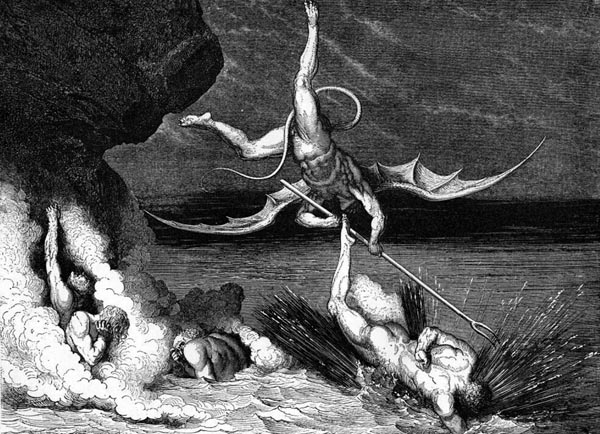
“…so he started up and shouted: ‘You are caught!’” (Inferno XXII: 125, 126)
Calcabrina, furious at the trick, flew on after him, wanting the sinner to escape, in order to quarrel. And when the barrator had vanished, he turned his claws on his friend, and grappled with him above the ditch. But the other was sparrow hawk enough to claw him thoroughly, and both dropped down, into the centre of the boiling pond.
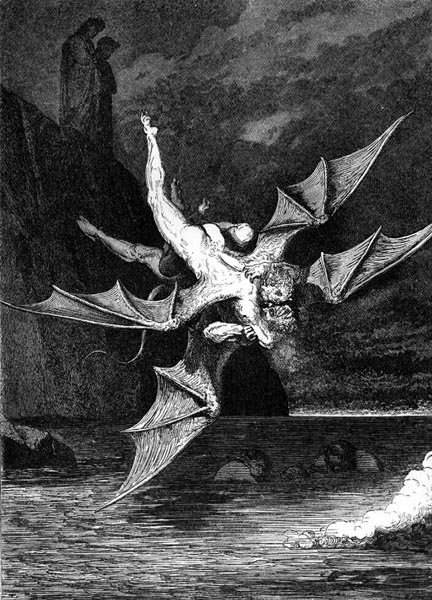
“But the other was sparrow hawk enough to claw him thoroughly, and both dropped down, into the centre of the boiling pond.” (Inferno XXII: 137—139)
The heat, instantly, separated them, but they could not rise, their wings were so glued up. Barbariccia, lamenting with the rest, made four fly over to the other bank, with all their grappling irons, and they dropped rapidly on both sides to the shore. They stretched their hooks out to the trapped pair, who were already scaled by the crust, and we left them, like that, embroiled.
Inferno Canto XXIII:1-57 The Sixth Chasm: The Hypocrites
Silent, alone, and free of company, we went on, one in front, and the other after, like minor friars journeying on their way. My thoughts were turned, by the recent quarrel, to Aesop’s fable of the frog and mouse, since ‘Si’ and ‘Yes’ are not better matched, than the one case with the other, if the thoughtful mind couples the beginning and end.
And as one thought springs from another, so another sprang from that, redoubling my fear. I thought of this: ‘Through us, these are mocked, and with a kind of hurt and ridicule, that I guess must annoy them. If anger is added to their malice, they will chase after us, fiercer than snapping dogs that chase a leveret.’ I felt my hair already lifting in fright, and was looking back intently, as I said: ‘Master, if you do not hide us both, quickly, I am afraid of the Malebranche: they are already behind us: I imagine I can hear them now.’
And he: ‘If I were made of silvered glass, I could not take up your image from outside more rapidly than I fix that image from within. Even now your thoughts were entering mine, with similar form and action, so that, from both, I have made one decision. If the right bank slopes enough, that we can drop down, into the next chasm, we will escape this imaginary pursuit.’ he had not finished stating this resolve, when I saw them, not far off, coming with extended wings, with desire to seize us.
My guide suddenly took me up like a mother, wakened by a noise, seeing flames burning in front of her eyes, who takes her child and runs, and caring more about him than herself, does not even wait to look around her. Down from the ridge of the solid bank, he threw himself forward on to the hanging cliff that dams up the side of the next chasm. Water never ran as fast through the conduit, turning a mill-wheel on land, when it reaches the paddles, as my Master, down that bank, carrying me, against his breast, like a son, and not a companion.
His feet had hardly touched the floor, of the depth below, before the demons were on the heights above us, but it gave him no fear, since the high Providence, that willed them to be the guardians of the fifth moat, takes, from all of them, the power to leave it.
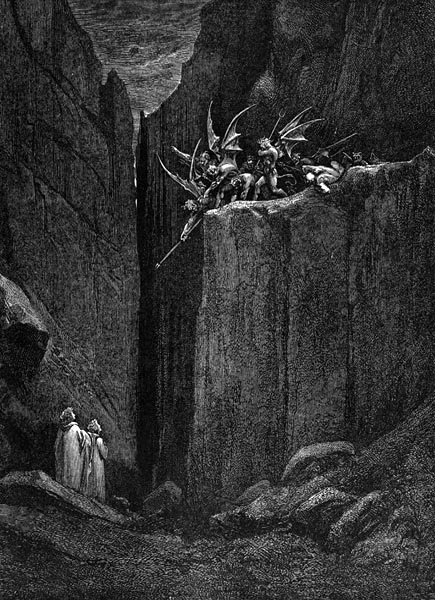
“His feet had hardly touched the floor, of the depth below, before the demons were on the heights above us…” (Inferno XXIII: 52—54)
Inferno Canto XXIII:58-81 The Hypocrites
Down below we found a metal-coated tribe, weeping, circling with very slow steps, and weary and defeated in their aspect. They had cloaks, with deep hoods over the eyes, in the shape they make for the monks of Cologne. On the outside they are gilded so it dazzles, but inside all leaden, and so heavy, that compared to them Frederick’s were made of straw.
O weary mantle for eternity! We turned to the left again, beside them, who were intent on their sad weeping, but those people, tired by their burden, came on so slowly that our companions were new at every step. At which, I said to my guide: ‘Make a search for someone known to us, by name or action, and gaze around as we move by.’ And one of them, who understood the Tuscan language, called after us: ‘Rest your feet, you who speed so fast through the dark air, maybe you will get from me what you request.’ At which my guide turned round and said: ‘Wait, and then go on, at his pace.’
Inferno Canto XXIII:82-126 The Frauti Gaudenti: Caiaphas
I stood still, and saw two spirits, who were eager in mind to join me, but their burden and the narrow path delayed them. When they arrived, they eyed me askance, for a long time, without speaking a word, then they turned to one another and said: ‘This one seems alive, by the movement of his throat, and if they are dead, by what grace are they moving, free of the heavy cloaks?’
Then they said to me: ‘O Tuscan, you have come to the college of sad hypocrites: do not scorn to tell us who you are.’ And I to them: ‘I was born, and I grew up, by Arno’s lovely river, in the great city: and I am in the body I have always worn. But you, who are you, from whom such sadness is distilled, that I see, coursing down your cheeks? And what punishment is this, that glitters so?’ And one of them replied: ‘Our orange mantles are of such dense lead, that weights made of it cause the scales to creak.
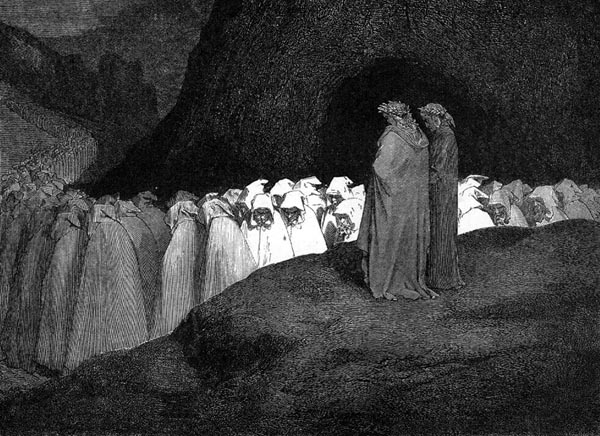
“‘O Tuscan, you have come to the college of sad hypocrites: do not scorn to tell us who you are.’” (Inferno XXIII: 92—94)
We were Fraudi Gaudenti, of that Bolognese order called the ‘Jovial Friars’: I am Catalano, and he is Loderingo, chosen by your city, as usually only one is chosen, to keep the peace: and we wrought such as still appears round your district of Gardingo. ‘O Friars, your evil….’ I began, but said no more, because one came in sight, crucified, on the ground, with three stakes. When he saw me he writhed all over, puffing into his beard, and sighing, and Friar Catalano, who saw this, said to me: ‘That one you look at, who is transfixed, is Caiaphas, the high priest, who counselled the Pharisees, that it was right to martyr one man for the sake of the people. Crosswise and naked he lies in the road, as you see, and feels the weight of everyone who passes: and his father-in-law Annas is racked, in this chasm, and the others of that Council, that was a source of evil to the Jews.’
Then I saw Virgil wonder at him, stretched out on the cross, so vilely, in eternal exile.
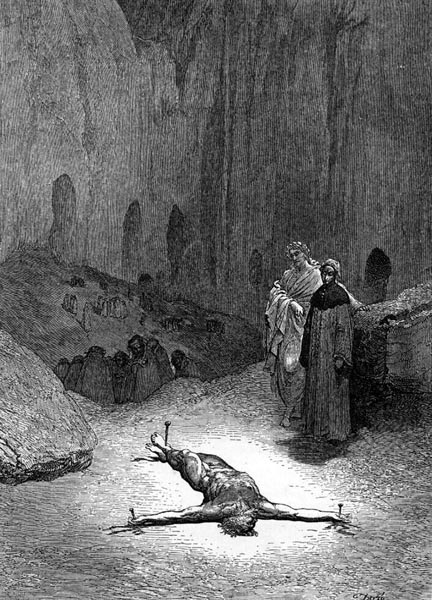
“‘That one you look at, who is transfixed, is Caiaphas, the high priest, who counselled the Pharisees, that it was right to martyr one man for the sake of the people.’” (Inferno XXIII: 117—120)
Inferno Canto XXIII:127-148 The Poets leave the Sixth Chasm
He addressed these words to the Friars, afterwards: ‘If it is lawful for you, may it not displease you, to tell us if there is any gap on the right, by which we might leave here, without forcing any of the black angels to come and extricate us from this deep.’ He replied: ‘There is a causeway that runs from the great circular wall and crosses all the cruel valleys, nearer at hand than you think, except that it is broken here and does not cover this one: you will be able to climb up among its ruins, that slope down the side, and form a mound at the base.’
Virgil stood, for a while, with bowed head, then said: ‘Malacoda, who grapples sinners over there, told us the way wrongly.’ And the Friar said: ‘I once heard the Devil’s vices related at Bologna, amongst which I heard that he is a liar, and the father of lies.’ Then my guide went striding on, his face somewhat disturbed by anger, at which I parted from the burdened souls, following the prints of his beloved feet.
Inferno Canto XXIV:1-60 The Poets climb up: Virgil exhorts Dante
In that part of the new year, when the sun cools his rays under Aquarius, and the nights already shorten towards the equinox; when the hoar-frost copies its white sister the snow’s, image on the ground, but the hardness of its tracery lasts only a little time; the peasant, whose fodder is exhausted, rises and looks out, and sees the fields all white, at which he strikes his thigh, goes back into the house, and wanders to and fro, lamenting, like a wretch who does not know what to do; then comes out again, and regains hope, seeing how the world has changed its aspect, in a moment; and takes his crook, and chases his lambs out to feed; so the Master made me disheartened, when I saw his forehead so troubled: but the plaster arrived quickly for the wound.
For, when we reached the shattered arch, my guide turned to me with that sweet aspect, that I first saw at the base of the mountain. He opened his arms, after having made some plan in his mind, first looking carefully at the ruin, and took hold of me. And like one who prepares and calculates, always seeming to provide in advance, so he, lifting me up towards the summit of one big block, searched for another fragment, saying: ‘Now clamber over that, but check first if it will carry you.’
It was no route for one clothed in a cloak of lead, since we could hardly climb from rock to rock, he weighing little, and I pushed from behind. And if the ascent were not shorter on that side than on the other, I would truly have been defeated, I do not know about him. But as Malebolge all drops towards the entrance to the lowest well, the position of every valley implies that the one side rises, and the other falls: at last, we came, however, to the point at which the last boulder ends.
The breath was so driven from my lungs, when I was up, that I could go no further: in fact, I sat down when I arrived. The Master said: ‘Now, you must free yourself from sloth: men do not achieve fame, sitting on down, or under coverlets; fame, without which whoever consumes his life leaves only such trace of himself, on earth, as smoke does in the air, or foam on water: so rise, and overcome weariness with spirit, that wins every battle, if it does not lie down with the gross body. A longer ladder must be climbed: to have left these behind is not enough: if you understand me, act now so it may profit you.’
I rose then, showing myself to be better filled with breath than I thought, and said: ‘Go on, I am strong again and ardent.’
Inferno Canto XXIV:61-96 The Seventh Chasm: The Thieves
We made our way along the causeway, which was rugged, narrow, difficult, and much steeper than before. I went, speaking, so that I might not seem weak, at which a voice came from the next moat, inadequate for forming words. I do not know what it said, though I was already on the summit of the bridge that crosses there, but he who spoke seemed full of anger. I had turned to look downwards, but my living eyes could not see the floor, for the darkness, so that I said: ‘Master, make sure you get to the other side, and let us climb down the wall, since as I hear sounds from below, but do not understand them, so I see down there, and make out nothing.’ He said: ‘I make you no answer, but by action, since a fair request should be followed, in silence, by the work.’
We went down the bridge, at the head of it, where it meets the eighth bank, and then the seventh chasm was open to me. I saw a fearful mass of snakes inside, and of such strange appearance, that even now the memory freezes my blood. Let Libya no longer vaunt its sands: though it engenders chelydri, and jaculi; pareae; and cenchres with amphisbaena; it never showed pests so numerous or dreadful, nor did Ethiopia, nor Arabia, the land that lies along the Red Sea. Amongst this cruel and mournful swarm, people were running, naked and terrified, without hope of concealment, or of that stone, the heliotrope, that renders the wearer invisible.
They had their hands tied behind them, with serpents, that fixed their head and tail between the loins, and were coiled in knots in front.
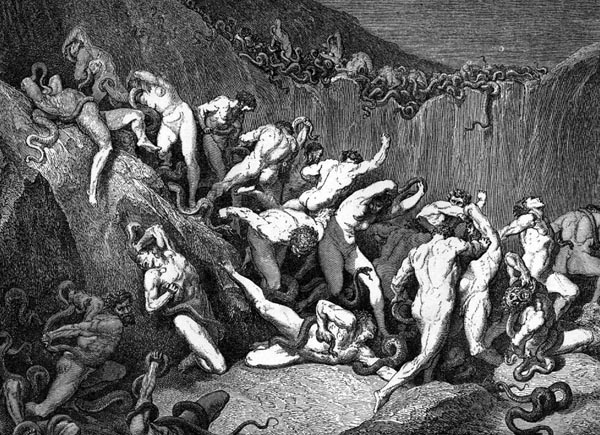
“Amongst this cruel and mournful swarm, people were running, naked and terrified, without hope of concealment, or of that stone, the heliotrope, that renders the wearer invisible.” (Inferno XXIV: 89—92)
Inferno Canto XXIV:97-129 Vanni Fucci and the serpent
And see, a serpent struck at one who was near our bank, and transfixed him, there, where the neck is joined to the shoulders. Neither ‘o’ nor ‘i’ was ever written as swiftly as he took fire, and burned, and dropped down, transformed to ashes: and after he was heaped on the ground, the powder gathered itself together, and immediately returned to its previous shape. So, great sages say, the phoenix dies, and then renews, when it nears its five-hundredth year. In its life it does not eat grass or grain, but only tears of incense, and amomum: and its last shroud is nard and myrrh.
The sinner when he rose was like one who falls, and does not know how, through the power of a demon that drags him down to the ground, or through some other affliction that binds men, and, when he rises, gazes round himself, all dazed by the great anguish he has suffered, and as he gazes, sighs. O how heavy the power of God, that showers down such blows in vengeance!
The guide then asked him who he was, at which he answered: ‘I rained down from Tuscany into this gully, a short while back. Brutish, not human, life pleased me, mule that I was: I am Vanni Fucci, the wild beast, and Pistoia was a fitting den for me.’ And I to the guide: ‘Tell him not to move: and ask what crime sank him down here, since I knew him as a man of blood and anger.
Inferno Canto XXIV:130-151 Vanni Fucci’s prophecy
And the sinner, who heard me, did not pretend, but turned his face and mind on me, and gave a look of saddened shame. Then he said: ‘It hurts me more for you to catch me, trapped, in the misery you see me in, than the moment of my being snatched from the other life. I cannot deny you what you ask. I am placed so deep down because I robbed the sacristy of its fine treasures, and it was once wrongly attributed to others. But, so that you might not take joy from this sight if you ever escape the gloomy regions, open your ears, and hear what I declare:
Pistoia first is thinned of Blacks: then Florence changes her people and her laws. Mars brings a vapour, from Valdimagra cloaked in turbid cloud, and a battle will be fought on the field of Piceno, in an angry and eager tempest, that will suddenly tear the mist open, so that every White is wounded by it. And I have said this to give you pain.’
Inferno Canto XXV:1-33 Cacus
At the end of his speech, the thief raised his hands, both making the fig, the obscene gesture, with thumb between fingers, shouting: ‘Take this, God, I aim it at you.’ From that moment the snakes were my friends, since one of them coiled itself round his neck, as if hissing: ‘You will not be able to speak again.’ Another, round his arms, tied him again, knotting itself so firmly in front, that he could not even shake them.
Ah, Pistoia, Pistoia, why do you not order yourself to be turned to ash, so that you may remain no longer, since you outdo your seed in evil-doing? I saw no spirit so arrogant towards God, through all the dark circles of the Inferno, not even, Capaneus, he who fell from the wall at Thebes. Vanni Fucci fled, saying not another word, and I saw a Centaur, full of rage, come, shouting: ‘Where is he, where is the bitter one?’
I do not believe Maremma has as many snakes, as he had on his haunches, there, where the human part begins. Over his shoulders, behind the head, lay a dragon with outstretched wings, and it scorches every one he meets. My Master said: ‘That is Cacus, who often made a lake of blood, below the rocks of Mount Aventine. He does not go with his brothers on the same road, above, because of his cunning theft from the great herd of oxen, pastured near him: for which his thieving actions ended, under the club of Hercules, who gave him a hundred blows perhaps with it, and he did not feel a tenth.
Inferno Canto XXV:34-78 Cianfa and Agnello
While he said this, the Centaur ran past, and three spirits came by, also, beneath us, whom neither I, nor my guide, saw, until they cried: ‘Who are you?’ Our words ceased, then, and we gave our attention to them, alone.
I did not know them, but it happened, as it usually does for some reason, that one had to call the other, saying: ‘Where has Cianfa gone?’ At which I placed my finger over my mouth, in order to make my guide stop and wait.
Reader, if you are slow to credit, now, what I have to tell, it will be no wonder, since I who saw it, scarcely credit it myself. While I kept looking at them, a six-footed serpent darted in front of one of them, and fastened itself on him, completely. It clasped his belly with it middle feet, seized his arms with the front ones, and then fixed its teeth in both his cheeks. The rear feet it stretched along his thighs, and put its tail between them, and curled it upwards round his loins, behind.
Ivy was never rooted to a tree, as the foul monster twined its limbs around the other. Then they clung together, as if they were melted wax, and mixed their colours: neither the one nor the other seemed what it had at first: just as in front of the flame on burning paper, a brown colour appears, not yet black, and the white is consumed.
The other two looked on, and each cried: ‘Ah me, Agnello, how you change! See, you are already not two, not one!’ The two heads had now become one, where two forms seemed to us merged in one face, and both were lost. Two limbs were made of the four forearms, the thighs, legs, belly and chest became such members as were never seen before. The former shape was all extinguished in them: the perverse image seemed both, and neither, and like that it moved away with slow steps.
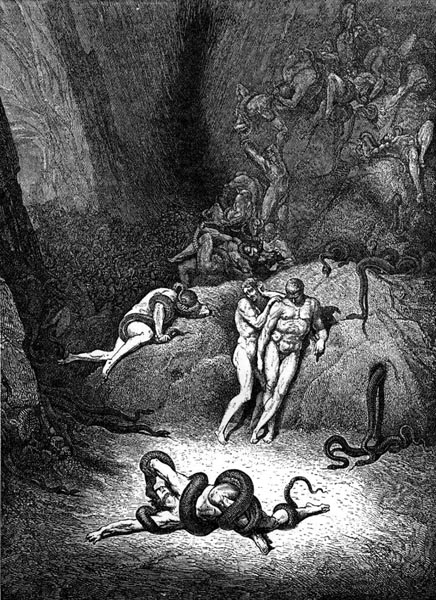
“The other two looked on, and each cried: ‘Ah me, Agnello, how you change!’” (Inferno XXV: 59—61)
Inferno Canto XXV:79-151 Buoso degli Abati and Francesco
As the lizard, in the great heat of the Dog days, appears like a flash of lightning, scurrying from hedge to hedge, if it crosses the track, so a little reptile came towards the bellies of the other two, burning with rage, black and livid as peppercorn. And it pierced that part, in one of them, where we first receive our nourishment from our mothers: then fell down, stretched out in front of him. The thief, transfixed, gazed at it but said nothing, but with motionless feet, only yawned, as if sleep or fever had overcome him. He looked at the snake: it looked at him: the one gave out smoke, violently, from his wound, the other from its mouth, and the smoke met.
Let Lucan now be silent, about Sabellus and Nasidius, and wait to hear that which I now tell. Let Ovid be silent about Cadmus and Arethusa: if he in poetry changes one into a snake, and the other into a fountain, I do not envy him, since he never transmuted two natures, face to face, so that both forms were eager to exchange their substance.
They merged together in such a way, that the serpent split its tail into a fork, and the wounded spirit brought his feet together. Along with them, the legs and thighs, so stuck to one another, that soon the join left no visible mark. The cleft tail took on the form lost in the other, and its skin grew soft, the other’s hard. I saw the arms enter the armpits: and the two feet of the beast that were short, lengthened themselves by as much as the arms were shortened. Then the two hind feet twisted together, and became the organ that a man conceals, and the wretch, from his, had two pushed out.
While the smoke covers them both with a new colour, and generates hair on one part, and strips it from another, the one rose up, erect, and the other fell, prostrate: not by that shifting their impious gaze, beneath which they mutually exchanged features. The erect one drew his face towards the temples, and from the excess of matter that swelled there, ears came, out of the smooth cheeks. That which did not slip back, but remained, formed a nose from the superfluous flesh, and enlarged the lips to their right size. He that lay prone, thrust his sharpened visage forward, and drew his ears back into his head, as the snail does its horns into its shell, and his tongue, which was solid before, and fit for speech, splits itself. In the other the forked tongue melds, and the smoke is still.
The soul that had become a beast, sped, hissing, along the valley, leaving the other, speaking and spluttering, behind him. Then the second turned his new-won shoulders towards him, and called to the other: ‘Buoso shall crawl, as I did, along this road.’ So I saw the seventh chasm’s bodies mutate and transmutate: and let the novelty of it be the excuse, if my pen has gone astray.
Though my sight was somewhat confused, and my mind dismayed, they could not flee so secretly, but that I clearly saw Puccio Sciancato: and it was he, alone, of the three companions, who had first arrived, who was not changed. One of the others, Francesco, was he who caused you, the people of Gaville, to weep.
Inferno Canto XXVI:1-42 The Eighth Chasm: The Evil Counsellors
Rejoice, Florence, that, since you are so mighty, you beat your wings over land and sea, and your name spreads through Hell itself. So, among the thieves, I found five of your citizens: at which I am ashamed, and you do not rise to great honour by it either. But if the truth is dreamed, as morning comes, you will soon feel what Prato, and others, wish on you. And, if it were come already, it would not be too soon: would it were so, now, as indeed it must come, since it will trouble me more, the older I am.
We left there, and my guide remounted by the stairs that the stones had made for us to descend, and drew me up: and, following our solitary way, among the crags and splinters of the cliff, the foot made no progress without the hand.
I was saddened then, and sadden now, again, when I direct my mind to what I saw, and rein in my intellect more than I am used, so that it does not run where virtue would not guide it, and so that, if a good star, or some truer power, has granted me the talent, I may not abuse the gift.
The eighth chasm was gleaming with flames, as numerous as the fireflies the peasant sees, as he rests on the hill, when the sun, who lights the world, hides his face least from us, and the fly gives way to the gnat down there, along the valley, where he gathers grapes, perhaps, and ploughs.
As soon as I came to where the floor showed itself, I saw them, and, as Elisha, the mockery of whom by children was avenged by bears, saw Elijah’s chariot departing, when the horses rose straight to Heaven, and could not follow it with his eyes, except by the flame alone, like a little cloud, ascending, so each of those flames moved, along the throat of the ditch, for none of them show the theft, but every flame steals a sinner.
Inferno Canto XXVI:43-84 Ulysses and Diomede
I stood on the bridge, having so risen to look, that if I had not caught hold of a rock I should have fallen in without being pushed. And the guide, who saw me so intent, said: ‘The spirits are inside those fires: each veils himself in that which burns him.’ I replied: ‘Master, I feel more assured from hearing you, but had already seen that it was so, and already wished to say to you, who is in that fire, that moves, divided at the summit, as if it rose from the pyre where Eteocles was cremated with his brother, Polynices?’
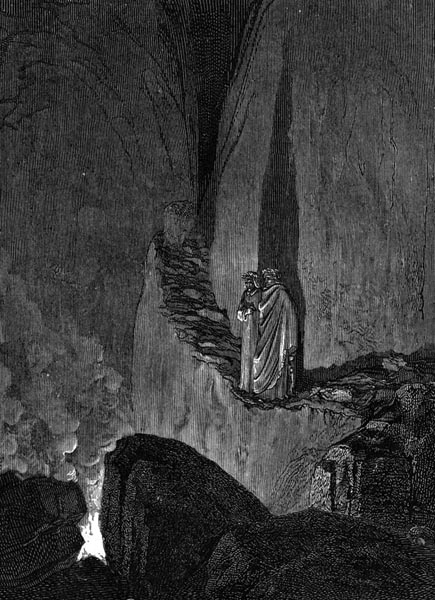
“…the guide, who saw me so intent, said: ‘The spirits are inside those fires: each veils himself in that which burns him.’ (Inferno XXVI: 46—49)
He answered me: ‘In there, Ulysses and Diomede are tormented, and so they go, together in punishment, as formerly in war: and, in their fire, they groan at the ambush of the Trojan horse, that made a doorway, by which Aeneas, the noble seed of the Romans issued out. In there they lament the trick, by which Deidamia, in death, still weeps for Achilles: and there, for the Palladium, they endure punishment.’
I said: ‘Master, I beg you greatly, and beg again so that my prayers may be a thousand, if those inside the fires can speak, do not refuse my waiting until the horned flame comes here: you see how I lean towards it with desire.’ And he to me: ‘Your request is worth much praise, and so I accept it, but restrain your tongue. Let me speak: since I conceive what you wish, and because they were Greeks they might disdain your Trojan words.’
When the flame had come, where the time and place seemed fitting, to my guide, I heard him speak, so: ‘O you, who are two in one fire, if I was worthy of you when I lived, if I was worthy of you, greatly or a little, when on earth I wrote the high verses, do not go, but let one of you tell where he, being lost through his own actions, went to die.’
Inferno Canto XXVI:85-142 Ulysses’s last voyage
The greater horn of the ancient flame started to shake itself, murmuring, like a flame struggling in the wind. Then moving the tip, as if it were a tongue speaking, gave out a voice, and said: ‘When I left Circe, who held me for more than a year, near to Gaeta, before Aeneas named it, not even my fondness for my son, Telemachus, my reverence for my aged father, Laërtes, nor the debt of love that should have made Penelope happy, could restrain in me the desire I had, to gain experience of the world, and of human vice and worth.
I set out on the wide, deep ocean, with only one ship, and that little company, that had not abandoned me. I saw both shores, as far as Spain, as far as Morocco, and the isle of Sardinia, and the other islands that sea washes. I, and my companions, were old, and slow, when we came to that narrow strait, where Hercules set up his pillars, to warn men from going further. I left Seville to starboard: already Ceuta was left behind on the other side.
I said: ‘O my brothers, who have reached the west, through a thousand dangers, do not deny the brief vigil, your senses have left to them, experience of the unpopulated world beyond the Sun. Consider your origin: you were not made to live like brutes, but to follow virtue and knowledge.’ With this brief speech I made my companions so eager for the voyage, that I could hardly have restrained them, and turning the prow towards morning, we made wings of our oars for that foolish flight, always turning south.
Night already saw the southern pole, with all its stars, and our northern pole was so low, it did not rise from the ocean bed. Five times the light beneath the moon had been quenched and relit, since we had entered on the deep pathways, when a mountain appeared to us, dim with distance, and it seemed to me the highest I had ever seen. We rejoiced, but soon our joy was turned to grief, when a tempest rose from the new land, and struck the prow of our ship. Three times it whirled her round, with all the ocean: at the fourth, it made the stern rise, and the prow sink, as it pleased another, till the sea closed over us.’
Inferno Canto XXVII:1-30 Guido Da Montefeltro
The flame was now erect and quiet, no longer speaking, and was going away from us, with the permission of the sweet poet, when another, that came behind forced us to turn our eyes towards its summit, since a confused sound escaped there.
As the Sicilian bull, that first bellowed with the groans of Perillus, who had smoothed it with his file (and that was right) bellowed with the sufferer’s voice, so that, although it was bronze, it seemed pierced with agony, so here, the dismal words, having, at their source, no exit from the fire, were changed into its language. But when they had found a path out through the tip, giving it the movement that the tongue had given in making them, we heard it say: ‘O you, at whom I direct my voice, and who, but now, was speaking Lombard, saying: “Now go: no more, I beg you”, let it not annoy you to stop and speak with me, though perhaps I have came a little late: you see it does not annoy me, and I burn.
If you are only now fallen into this blind world, from that sweet Latian land, from which I bring all my guilt, tell me if Romagna has peace or war, for I was of the mountains there, between Urbino and Monte Coronaro, the source from which the Tiber springs.’
Inferno Canto XXVII:31-57 The situation in Romagna
I was still leaning downwards eagerly, when my leader touched me on the side, saying: ‘Speak, this is a Latian.’ And I who had my answer ready, began to speak then without delay: ‘O spirit, hidden there below, your Romagna is not, and never has been, without war in the hearts of her tyrants: but I left no open war there now.
Ravenna stands, as it has stood for many years: Guido Vecchio da Polenta’s eagle broods over it, so that it covers Cervia with its claws. That city, Forlì, that withstood so long a siege, and made a bloody pile of Frenchmen, finds itself again under the paws of Ordelaffi’s green lion.
Malatesta, the old mastiff of Verruchio, and the young one, Malatestino, who made bad jailors for Montagna, sharpen their teeth, where they used to do. Faenza, on the Lamone, and Imola on the Santerno, those cities lead out Pagano, the lion of the white lair, who changes sides when he goes from south to north, and Cesena, that city whose walls the Savio bathes, where it lies between the mountain and the plain, likewise lives between freedom and tyranny.
Now I beg you, tell us who you are: do not be harder than others have been to you, so that your name may keep its lustre on earth.’
Inferno Canto XXVII:58-136 Guido’s history
When the flame had roared for a while as usual, it flickered the sharp point to and fro, and then gave out this breath: ‘If I thought my answer was given to one who could ever return to the world, this flame would flicker no more, but since, if what I hear is true, no one ever returned, alive, from this deep, I reply, without fear of defamation.
I, Guido da Montefeltro, was a man of arms: and then became a Cordelier of Saint Francis, hoping to make amends, so habited: and indeed my hopes would have been realised in full, but for the Great Priest, Boniface, evil to him, who drew me back to my first sins: and how and why, I want you to hear from me.
While I was in the form of bones and pulp, that my mother gave me, my actions were not those of the lion, but of the fox. I knew all the tricks and coverts, and employed the art of them so well, that the noise went out to the ends of the earth. When I found myself arrived at that point of life, when everyone should furl their sails, and gather in the ropes, what had pleased me before, now grieved me, and with repentance and confession, I turned monk. Ah misery! Alas, it would have served me well.
But the Prince of the Pharisees; that Pope waging war near the Lateran, and not with Saracens or Jews, since all his enemies were Christians, and none had been to conquer Acre, or been a merchant in the Sultan’s land; had no regard for the highest office, nor holy orders, nor my habit of Saint Francis, that used to make those who wore it leaner; but as the Emperor Constantine sought out Saint Sylvester, on Mount Soracte, to cure his leprosy, so this man called me, as a doctor to cure his feverish pride. He demanded counsel of me, and I kept silent, since his speech seemed drunken.
Then he said to me: ‘Do not be doubtful, I absolve you beforehand: and, you, teach me how to act, so that I may raze the fortress of Palestrina to the ground. I can open and close Heaven as you know, with the two keys, that my predecessor, Celestine, did not prize.’ Then the weighty arguments forced me to consider silence worse, and I said: ‘Father, since you absolve me of that sin, into which I must now fall, large promises to your enemies, with little delivery of them, will give you victory, from your high throne.’
Afterwards, when I was dead, Saint Francis came for me: but one of the Black Cherubim said to him: ‘Do not take him: do not wrong me. He must descend among my servants, because he gave a counsel of deceit, since when I have kept him fast by the hair: he who does not repent, cannot be absolved: nor can one repent a thing, and at the same time will it, since the contradiction is not allowed.’ O miserable self! How I started, when he seized me, saying to me: ‘Perhaps you did not think I was a logician.’
He carried me to Minos, who coiled his tail eight times round his fearful back, and then, biting it in great rage, said: ‘This sinner is for the thievish fire’, and so I am lost here, as you see, and clothed like this, go inwardly grieving.’
When he had ended his speech, so, the flame went sorrowing, writhing and flickering its sharp horn. We passed on, my guide and I, along the cliff, up to the other arch, that covers the next ditch, in which the reward is paid to those who collect guilt by sowing discord.
Inferno Canto XXVIII:1-21 The Ninth Chasm: The Sowers of Discord
Who could ever fully tell, even with repeated unimprisoned words, the blood and wounds I saw now? Every tongue would certainly fail, since our speech and memory have too small a capacity to comprehend so much. If all the people, too, were gathered, who once grieved for their blood, in the fateful land of Apulia, by reason of the Samnite War of the Romans, of Trojan seed; and those, from that long Punic War, that, as Livy writes, who does not err, yielded so great a wealth of rings, from Cannae’s battlefield; and those who felt the pain of blows by withstanding Robert Guiscard; and the rest, whose bones are still heaped at Ceperano, where all the Apulians turned traitor, for Charles of Anjou; and there, at Tagliacozzo where old Alardo’s advice to Charles conquered without weapons: and some were to show pierced limbs, and others severed stumps; it would be nothing to equal the hideous state of the ninth chasm.
Inferno Canto XXVIII:22-54 Mahomet: the Caliph Ali
Even a wine-cask, that has lost a stave in the middle or the end, does not yawn as widely, as a spirit I saw, cleft from the chin down to the part that gives out the foulest sound: the entrails hung between his legs: the organs appeared, and the miserable gut that makes excrement of what is swallowed.
While I stood looking wholly at him, he gazed at me, and opened his chest with his hands, saying: ‘See how I tear myself: see how Mahomet is ripped! In front of me, Ali goes, weeping, his face split from chin to scalp, and all the others you see here, were sowers of scandal and schism in their lifetimes: so they are cleft like this. There is a devil behind who tears us cruelly like this, reapplying his sword blade to each of this crowd, when they have wandered round the sad road, since the wounds heal before any reach him again.
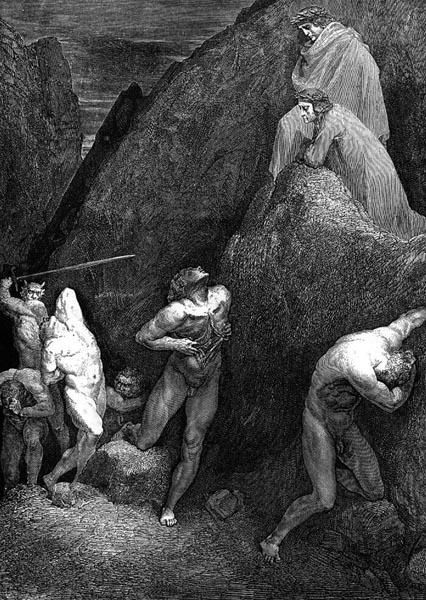
“‘See how I tear myself: see how Mahomet is ripped!’” (Inferno XXVIII: 30—31)
But who are you, who muse there on the cliff, maybe to delay your path to punishment, in sentence for your crimes?’
My Master replied: ‘Death has not come to him yet, nor does guilt lead him to torment, but it is incumbent on me, who am dead, to grant him full experience, and lead him, through the Inferno, down here, from circle to circle, and this is truth, that I tell you.’ When they heard him, more than a hundred spirits, in the ditch, halted, to look at me, forgetting their agony, in their wonder.
Inferno Canto XXVIII:55-90 Pier della Medicina and others
After lifting up one foot, to leave, Mahomet said to me: ‘Well now, you who will soon see the sun, perhaps, tell Fra Dolcino of the Apostolic Brothers, if he does not wish to follow me, quickly, down here, to furnish himself with supplies, so that the snow-falls may not bring a victory for the Novarese, that otherwise would be difficult to achieve.’ Then, he strode forward to depart.
Another, who had his throat slit, and nose cut off to the eyebrows, and had only a single ear, standing to gaze in wonder with the rest, opened his wind-pipe, that was red outside, all over, and said: ‘You, that no guilt condemns, and whom I have seen above on Latian ground, unless resemblance deceives me, remember Pier della Medicina, if you ever return to see the gentle plain, that slopes down from Vercelli to Marcabò. And make known to the worthiest two men in Fano, Messer Guido, and Angiolello, also, that unless our prophetic powers here are in vain, they will be cast out of their boat, and drowned near Cattolica, by treachery. Neptune never saw a greater crime, between the isles of Cyprus and Majorca, not even among those carried out by pirates, or by Greeks. Malatestino, the treacherous one, who only sees with one eye, and holds the land, that one, who is here with me, wishes he had never seen, will make them come to parley with him, then act so that they will have no need of vow or prayer to counter Focara’s winds.
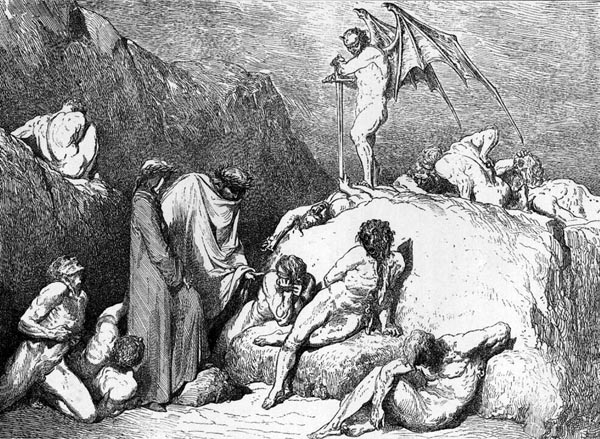
“‘…remember Pier della Medicina, if you ever return to see the gentle plain, that slopes down from Vercelli to Marcabò.’” (Inferno XXVIII: 69—72)
Inferno Canto XXVIII:91-111 Curio and Mosca
And I said to him: ‘If you would have me carry news of you, above, show me and explain who he is that rues the sight of it.’ Then he placed his hand on the jaw of one of his companions, and opened the mouth, saying: ‘ This is he: and he does not speak. This outcast quelled Caesar’s doubts at the Rubicon, saying that delay always harms men who are ready.’ O how dejected, Curio seemed to me, with his tongue slit in his palate, who was so bold in speech!
And one who had both hands severed, lifting the stumps through the dark air, so that their blood stained his face, said: ‘You will remember Mosca too, who said, alas, “A thing done, has an end” which was seed of evil to the Tuscan race.’ ‘And death to your people,’ I added, at which he, accumulating pain on pain, went away like one sad and mad.
Inferno Canto XXVIII:112-142 Bertrand de Born
But I remained behind to view the crowd, and saw a thing, which, without more proof, I would be afraid to even tell, except that conscience reassures me, the good companion, that strengthens a man, under the armour of his self-respect.
I saw it clearly, and still seem to see, a headless trunk, that goes on before, like the others, in that miserable crew, and holds its severed head, by the hair, swinging, like a lantern, in its hand. It looked at us, and said: ‘Ah me!’. It made a lamp of itself, to light itself, and there were two in one, and one in two: how that can be he knows, who made it so.
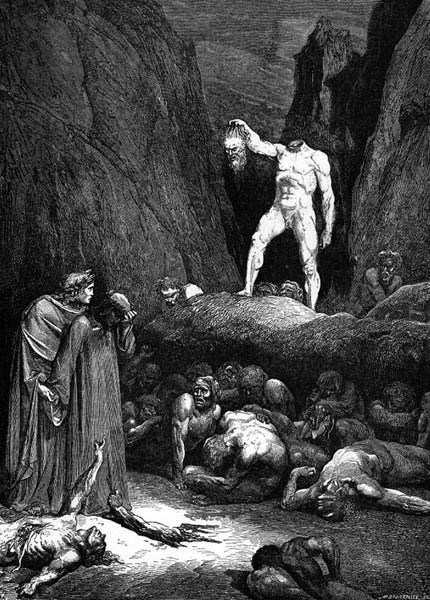
“‘…holds its severed head, by the hair, swinging, like a lantern, in its hand. It looked at us, and said: ‘Ah me!’” (Inferno XXVIII: 116—119)
When it was right at the foot of our bridge, it lifted its arm high, complete with the head, to bring its words near to us, which were: ‘Now you see the grievous punishment, you, who go, alive and breathing, to see the dead: look if any are as great as this. And so that you may carry news of me, know that I am Bertrand de Born, he who gave evil counsel to the Young King. I made the father and the son rebel against each other: Ahithophel did no more for Absalom and David, by his malicious stirrings.
Because I parted those who were once joined, I carry my intellect, alas, split from its origin in this body. So, in me, is seen just retribution.